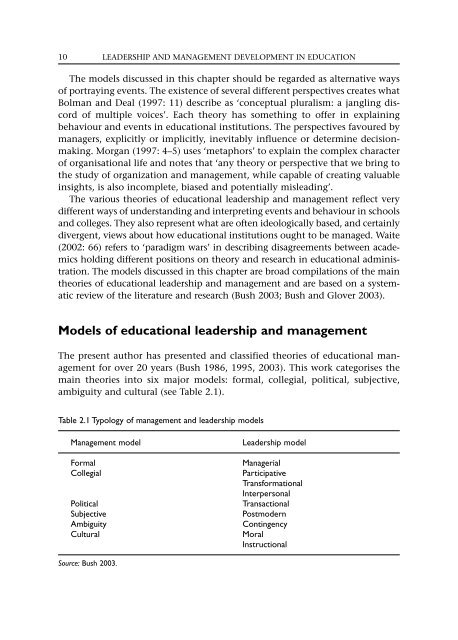Leadership and Management Development in Education (Education ...
Leadership and Management Development in Education (Education ...
Leadership and Management Development in Education (Education ...
Create successful ePaper yourself
Turn your PDF publications into a flip-book with our unique Google optimized e-Paper software.
10LEADERSHIP AND MANAGEMENT DEVELOPMENT IN EDUCATIONThe models discussed <strong>in</strong> this chapter should be regarded as alternative waysof portray<strong>in</strong>g events. The existence of several different perspectives creates whatBolman <strong>and</strong> Deal (1997: 11) describe as ‘conceptual pluralism: a jangl<strong>in</strong>g discordof multiple voices’. Each theory has someth<strong>in</strong>g to offer <strong>in</strong> expla<strong>in</strong><strong>in</strong>gbehaviour <strong>and</strong> events <strong>in</strong> educational <strong>in</strong>stitutions. The perspectives favoured bymanagers, explicitly or implicitly, <strong>in</strong>evitably <strong>in</strong>fluence or determ<strong>in</strong>e decisionmak<strong>in</strong>g.Morgan (1997: 4–5) uses ‘metaphors’ to expla<strong>in</strong> the complex characterof organisational life <strong>and</strong> notes that ‘any theory or perspective that we br<strong>in</strong>g tothe study of organization <strong>and</strong> management, while capable of creat<strong>in</strong>g valuable<strong>in</strong>sights, is also <strong>in</strong>complete, biased <strong>and</strong> potentially mislead<strong>in</strong>g’.The various theories of educational leadership <strong>and</strong> management reflect verydifferent ways of underst<strong>and</strong><strong>in</strong>g <strong>and</strong> <strong>in</strong>terpret<strong>in</strong>g events <strong>and</strong> behaviour <strong>in</strong> schools<strong>and</strong> colleges. They also represent what are often ideologically based, <strong>and</strong> certa<strong>in</strong>lydivergent, views about how educational <strong>in</strong>stitutions ought to be managed. Waite(2002: 66) refers to ‘paradigm wars’ <strong>in</strong> describ<strong>in</strong>g disagreements between academicshold<strong>in</strong>g different positions on theory <strong>and</strong> research <strong>in</strong> educational adm<strong>in</strong>istration.The models discussed <strong>in</strong> this chapter are broad compilations of the ma<strong>in</strong>theories of educational leadership <strong>and</strong> management <strong>and</strong> are based on a systematicreview of the literature <strong>and</strong> research (Bush 2003; Bush <strong>and</strong> Glover 2003).Models of educational leadership <strong>and</strong> managementThe present author has presented <strong>and</strong> classified theories of educational managementfor over 20 years (Bush 1986, 1995, 2003). This work categorises thema<strong>in</strong> theories <strong>in</strong>to six major models: formal, collegial, political, subjective,ambiguity <strong>and</strong> cultural (see Table 2.1).Table 2.1 Typology of management <strong>and</strong> leadership models<strong>Management</strong> modelFormalCollegialPoliticalSubjectiveAmbiguityCultural<strong>Leadership</strong> modelManagerialParticipativeTransformationalInterpersonalTransactionalPostmodernCont<strong>in</strong>gencyMoralInstructionalSource: Bush 2003.
















